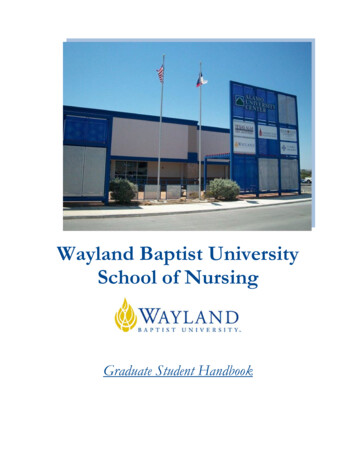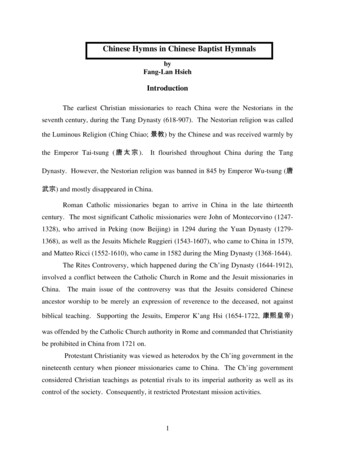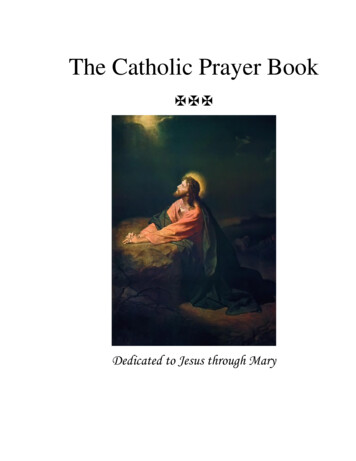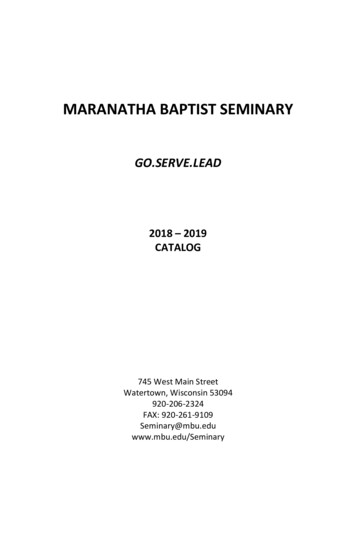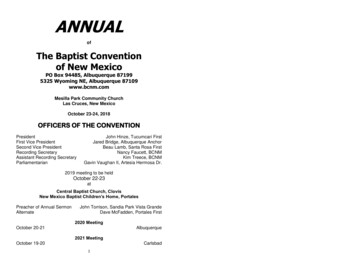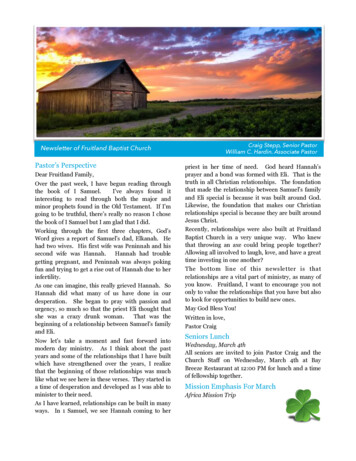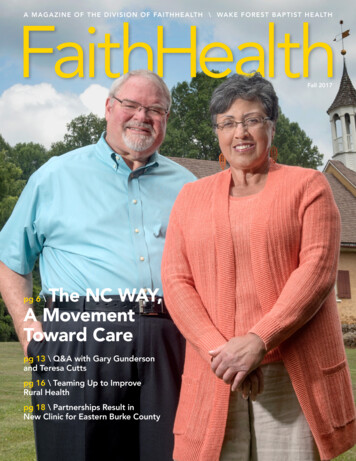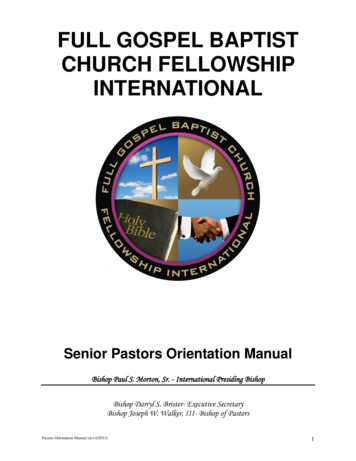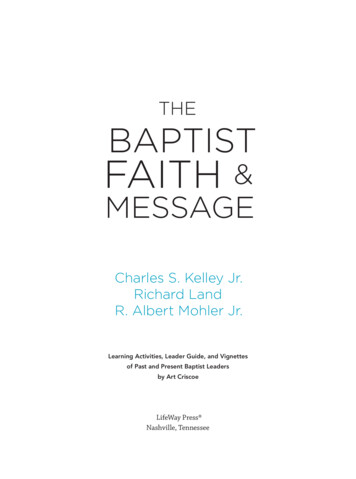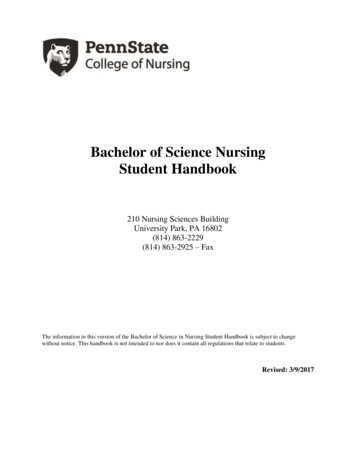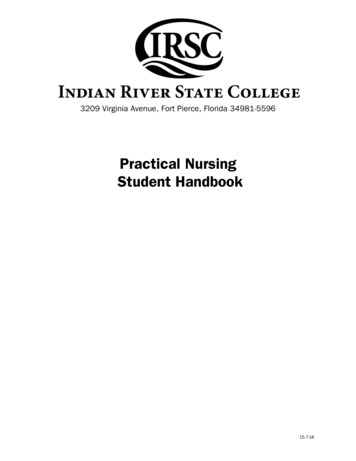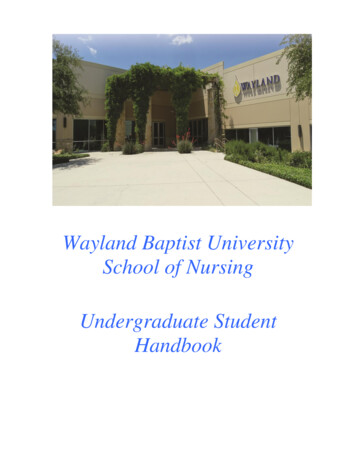
Transcription
Wayland Baptist UniversitySchool of NursingUndergraduate StudentHandbook
2Table of ContentsMission Statement .3Philosophy .3Program Outcomes of the BSN Program 4Admission.4General Academic Core .5Nursing Course Descriptions .5Nursing Student Conduct .11Discipline Policy . .12Substance Abuse Policy . .16University Sanctions .16Criminal Sanctions .17Holidays .18Semesters .18Withdrawal from the University .18Registration .19Eligibility Requirements. .20Transfer Policy .21Class and Clinical Attendance .22Grading system .23Annual Notification of Rights under Family Educational Rights & Privacy Act .23Directory Information .24Students Grade Appeals .25Student Clinical Evaluation .28Academic integrity .28Plagiarism .30Library and Research Resources .30Testing Policy .31Examity Proctor System Guidelines for Online Exam .32Licensure readiness policy. .33Textbooks .33Course Evaluations .34School Committees .34Statement on Plagiarism and Academic Dishonesty (ownership). .34Disability Statement .34Discrimination . .34Student Grievance Policy. .34Sexual Harassment.35Information Technology and Telecommunication Services .35Accessing Your WBU Email. .37Wayland Baptist University Policy on Social Media . .37School of Nursing Student Handbook and Eligibility Requirements .39Photo Release . . .41Uniform Dress Code Policy . .43
3Mission StatementThe School of Nursing Mission statement is based on the values and beliefs of theWayland Baptist University Mission. The Mission of Wayland Baptist University Schoolof Nursing is to educate students in a Christian environment. The goal is to preparegraduates who provide holistic nursing care at both beginning and advanced practicelevels, in a diverse health care world. The school prepares graduates who are committedto providing excellent, evidenced based patient care, teaching, service and outreach.PhilosophyWayland Baptist University School of Nursing faculty believes that the profession ofnursing should be able to respond to the health care needs of individuals in an everchanging environment. A knowledge base built from both the arts and the sciences helpsbuild a foundation for core competency in professional nursing. The nurse then expandsknowledge, skills and critical thinking through study of disease, health promotion, andhealth prevention for individuals in the health care environment.The faculty believes the educational process involves a shared responsibility betweenstudents and faculty. The development of clinical skills, communication, critical thinkingand the understanding of diversity are essential acquisitions from a nursing education.The student must be able to care for the individual holistically, and also understand thesocial, cultural, racial and ethnic needs of the individual.The faculty believes collaboration with members of the health care team is an integralpart of care for individuals. The baccalaureate nurse graduate should be able tocommunicate needs of individuals with members of other disciplines on the health careteam so that a plan of care can be developed and delivered providing quality care.During this care the graduate will be cognizant of the legal, ethical and professionalstandards necessary in providing individuals with competent quality care.The faculty believes the graduate will provide continuous teaching opportunities toindividuals as an integral part of their plan of care. Learning needs assessment is alwaysessential in the delivery of care. The graduate will also accept the responsibility for theircontinuous learning to provide for their growth and continued competence. The graduatewill be able to demonstrate entry level competencies in the roles of Provider of Care,Coordinator of Care and as a Member of the Profession.The Wayland Baptist University School of Nursing faculty is committed to meet theneeds of the health care community by graduating dedicated baccalaureate preparednurses who engage in safe, quality nursing practice.
4Program Outcomes of the BSN Program Upon graduation the graduate will be able to function as practitioners and leadersof nursing who will be self-directed and responsible for making continuingcontributions to the healthcare delivery system as evidenced by practicing in ahealth care environment that fosters safe and responsible nursing care. Thegraduate will participate in nursing organizations that encourage professionalleadership roles in the nursing community.Upon graduation the graduate will continue lifelong learning and will have thefoundation for graduate study as evidenced by the graduate participating incontinuing education activities and acknowledgement by graduate nursingprograms that the student is prepared for graduate study.Upon graduation the graduate will promote involvement in both professional andcommunity organizations and activities as evidenced by the graduate participatingin these types of organizations.Upon graduation the graduate will accept personal accountability for ethical andcompetent nursing practice, as well as for continuing professional and personaldevelopment as evidenced by acknowledging responsibility for the care providedto clients. The graduate will also continue to enhance her/his learning bothprofessionally and personally to improve client care.Upon graduation the graduate will base clinical practice on methods of scientificinquiry, including the nursing process, to meet client’s needs for increasinglycomplex health care in various settings.Upon graduation the graduate will apply concepts from nursing theories andresearch, cultural competencies, the sciences and humanities, to assess individualclient’s/families/communities’ needs for nursing intervention.Upon graduation the graduate will collaborate with clients and other health careprofessionals to plan and deliver health care services.Upon graduation the graduate will communicate effectively, orally, and inwriting, and will critically think about major concepts and processes essential tonursing (legal and ethical issues, effective leadership and clinical excellence).Admissions:School of Nursing AdmissionAll students who plan to enroll in the Bachelor of Science in Nursing program mustcomplete admission requirements for the University first.Applicants for admission to the School of Nursing must complete the application processas follows: BSN - February 15 for Summer admission and by August 15 for Winteradmission. LVN-BSN: May 15 for Fall Admission and Nov 15 for Spring admission.Admission to the program may be limited based on the availability of faculty and practicesites.
5The students’ academic record and the Test of Essential Academic Skills (TEAS) areconsidered for admission including the following criteria: Completion of all prerequisite courses with a minimum grade of CA minimum cumulative GPA of 2.5 on a 4.0 scale in all course workA minimum cumulative ranking score of 18 (criteria include TEAS overall score, TEASreading comprehension score, TEAS English score, grades for Anatomy and Physiology Iand II, grades for Microbiology and Pathophysiology, and cumulative GPA). In the eventthat we have to make a decision between several students with the same scores, thestudents with the highest overall TEAS score will be admitted.All students will be required to obtain a background check through the Texas Board ofNursing (TXBON). Any student who must submit a declaratory to the TXBON will notbe granted admission to the program until they have been cleared by the TXBON.All students will be required to pass a drug screen prior to admission.Nursing Courses:Generic BSNFirst Term:NURS 3622 Fundamentals of Nursing – This course introduces students to the role ofnursing as a profession and a practice. Emphasis is on the nurse as a provider of patientcentered care, patient advocate, member of the healthcare team, and member of thenursing profession. Focus on understanding of select fundamental biophysical,psychosocial, and professional nursing concepts with nursing interventions and clinicaldecision making for patients and their families. A strong emphasis is placed on theacquisition of theory and skills necessary for the practice of nursing. Eight lecture hours,four lab hours, and 8 clinical hours.NURS 3421 Health Assessment - The presentation of key concepts, theories andtechniques involved in the physical assessment for the adult, geriatric adult, infant andexpected mother relevant to practice as a registered nurse. This course will explore themajor concepts and conceptual issues underlying the normal and abnormal physicalpresentation of the client. Introduction to pathophysiological concepts of the diseaseprocesses will be covered. The course is intended to assist students in clarifyingconceptual issues in the basic technical aspects of assessment of anatomy,pathophysiology, including bedside application of these assessment skills. Laboratorytests and diagnostic tests are also incorporated. The emphasis on caring is displayedthrough themes of assessment from a holistic approach: cultural, spiritual, familial, andenvironmental considerations, are included. Client dignity and health promotion arereinforced in conjunction with the Fundamentals course content. Emphasis will beplaced on communication of specific health assessment findings and acquiring health
6assessment knowledge and skills based on evidence based scientific rationale. Twolecture hours, 6 lab hours.Second Term:NURS 3430 Introduction to Medical Surgical Nursing: Integration of professionalcompetencies in the nursing care of diverse adult patients throughout the lifespan.Emphasis is on the nurse as a provider of patient-centered care, patient advocate, memberof the healthcare team and member of the profession. Focus on understanding of selectedbiophysical, psychosocial, and professional nursing concepts with nursing interventionsand clinical decision making for patients and their families. Four lecture hours, 2 labhours, 12 clinical hours.NURS 3424 Pharmacology: Nursing Implications: This course introduces the studentto the fundamental principles of pharmacology. Investigates the major classifications ofdrugs with emphasis on pharmacotherapeutic actions and nursing implications.Previously learned skills and concepts, as well as, prerequisite science courses areintegrated into the discussions. Four lecture hours.Third Term:NURS 3423 Childbearing Nursing: This course focuses on the culturally diversechildbearing women, their families and their adaptation to pregnancy and childbirth.Students will study the holistic nursing care related to the prenatal, antepartum,intrapartum, and postpartum phases of maternity care, the high risk mother, high riskneonate, labor and postpartum complications. Focus is on the application, analysis andsynthesis of selected biophysical, psychosocial, and professional nursing and health caresystem concepts utilizing evidence based practice in the interventions and clinicaldecision making for patients and their families. Four lecture hours, 8 clinical hours.NURS 3425 Pediatric Nursing: This course introduces the student to the care of thewell child, the child with special needs and the child with acute and chronic health careneeds. Strong emphasis is on maintaining dignity of the child and promoting healthygrowth and development, even during illness. The child’s family needs will beexamined. Three lecture hours, 8 clinical hours.Fourth Term:NURS 3210 Health Promotion and Maintenance: This course will focus on specificcommunity and individual needs in the delivery of disease prevention and healthpromotion. The student will have an overview of conceptual foundations and theoreticalapproaches. Factors related to health promotion will be discussed. Health promotionwill be examined throughout the life cycle and promotion strategies and interventionswill be addressed. Three lecture hours.
7NURS 3630 Intermediate Medical Surgical Nursing: In depth coverage of health careconcepts with application through selected exemplars. Analysis of previous knowledgeand skills forms the foundation with the emphasis on the nurse as a provider of patientcentered care, patient advocate, and professional member of an interdisciplinary healthcare team. Focus is on the application, analysis, and synthesis of selected biophysical,psychosocial, and professional nursing concepts utilizing evidence based practice in theinterventions and clinical decision making for patients and families. Three lecture hours,sixteen clinical hours.Fifth Term: BreakSixth Term:NURS 4535 Community and Public Health Nursing: The presentation of keyconcepts, theories, and issues relevant to practice as a public health/community healthnurse. This course will explore the major concepts and conceptual issues underlying thespecialty of community-oriented nursing, including the dimensions of public health andcommunity health nursing. The course is intended to assist students in clarifyingconceptual issues in the specialty and in beginning to develop positions on critical healthcare issues including access to care, disparities, vulnerable populations, health promotionacross the lifespan and the implementation and progress of Healthy People 2020 NationalHealth Objectives. Three lecture hours, eight clinical hours.NURS 4445 Mental Health Nursing: Focuses on the physiological and psychologicalconcepts of mental health related to acute and chronic health problems across thelifespan. The role of the professional nurse in health promotion and illness preventionare key components. Emphasis is placed on mental health milieu that exists in both thehospital and community settings. Three lecture hours, eight clinical hours.Seventh TermNURS 4442 Leadership and Management: This course explores concepts ofleadership and management through an examination of various leadership/managementtheories, organizational and resource management styles, meeting consumer needs anddelegation of nursing care. The course will explore essentials of the nurse leader andmanager, such as delegation, decision-making, and conflict management. Throughout thecourse, the emphasis will be on the use of critical thinking and critical reasoning. Fourlecture hours, eight clinical hours.NURS 4348 Nursing Theories and Research: In-depth coverage of nursing today, thehistory and social context of nursing, defining nursing and socialization to professionalpractice, conceptual and philosophical bases of nursing, and nursing theory. Emphasis isgiven to the concepts of evidence based practice which is utilized in patient centered care,professionalism, quality improvement, safety and team/collaboration. Four lecture hours.
8Eighth TermNURS 4630 Advanced Medical Surgical Nursing: This course integrates previouslylearned professional nursing competencies in the care of a diverse adult population withadvanced medical surgical disease processes. Analysis of previous knowledge and skillsforms the foundation with the emphasis on the nurse as provider of patient-centered care,patient advocate, and professional member of an interdisciplinary health care team.Focus is on the application, analysis and synthesis of selected biophysical, psychosocial,and professional nursing concepts utilizing evidence based practice in the interventionsand clinical decision making for patients and their families. Three hours lecture, Sixteenclinical hours.NURS 4332 Ethical and Legal Issues in Nursing: This course investigates currentethical issues facing nursing today and current historical legal issues. Previously learnedskills and concepts, as well as prerequisites science courses are integrated into thediscussions. Four lecture hours.LVN-BSN Curriculum PlanThe LVN to BSN program allows a Licensed Vocational Nurse to complete a Bachelor ofScience Degree in Nursing in seven semesters instead of 8. The student completes 70semester credit hours of prerequisite coursework prior to beginning the program. Thestudent will receive 9 semester credit hours of upper-level nursing credit for theirprevious course work for their LVN. The student will complete the program with 60semester credit hours of upper-level nursing courses.The prerequisite course work is the same course work that the generic BSN student musttake, with the exception of BIOL 3310 Medical Terminology. See the above GeneralAcademic Core for course descriptions. The nursing courses must be sequential. Thestudent may enter the program beginning fall or spring term. The following are thecourse descriptions for the LVN to BSN program. The courses will be offered in thefollowing sequence.First Term:NURS 3424 Pharmacology: Nursing Implications: This course introduces the studentto the fundamental principles of pharmacology. Investigates the major classifications o
The Wayland Baptist University School of Nursing faculty is committed to meet the needs of the health care community by graduating dedicated baccalaureate prepared nurses who engage in safe, qualit
